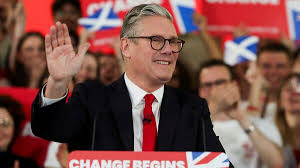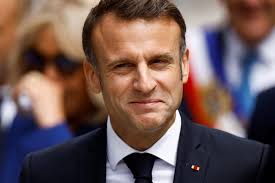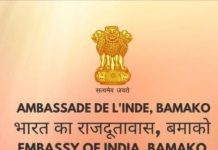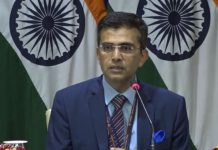Despite American reluctance to let the Russia-Ukraine conflict end, many believe that the outcome of the recently held elections in the U.K. and France might finally enable them to reinvent their role in geopolitics by Gopal Misra

The new British leadership, led by Labour Party Prime Minister Keir Starmer, is faced with the twin tasks of reviving the country’s perennially ailing economy and reclaiming its cherished role in geopolitics.
It reminds us of the role the Labour Party had played during the post World War-II years, when the then Prime Minister Clement Atlee had finally conceded the demand for Indian independence. However, the partition of India was also legitimized during his tenure by an Act of British Parliament. Keir Starmer is talking about strategic ties with India and is also ready for free trade partnership, but the new ruling party has already been asking for a UN-led referendum in Kashmir. The Indian strategic affairs experts, however, are amused by this resolution. It is being stated that since the Kashmir issue is directly related to the British Act partitioning India, that too under the Labour Party regime, therefore, it should have been asking for a referendum in Sindh, Baluchistan and the north-western frontier, now renamed as Khyber Pakhtunkhwa.
It, indeed, is quite difficult for the present leadership of the Labour Party to reassert the role of Britain in geopolitics. If Clement Atlee had not implemented the plan of India’s partition envisaged by the outgoing PM Winston Churchill, a journalist-turned politician, an independent united India might have been an asset to the U.K.

The British politicians as well as academicians of its much-acclaimed universities have paid little attention to the historical blunder of communalising India’s plural society. The deliberate fragmenting of the jewel of the British crown i.e. India, has finally relegated Britain as just one of the European powers, perhaps much weaker than its rivals Germany and France.
Pax Britannica
The British politicians may be hesitant to discuss and reinterpret the concept of Pax Britannia. The hope, however, has been rekindled following the electoral victory of the Labour Party in the recently held polls. It is being asked whether the concept of Pax Britannica, for ending conflicts across the continents, is still relevant. The peace or truce during the colonial era among the then world powers vying with each other in occupying or subjugating vast territories in Africa, Asia, Australia and Americas had retained peace among themselves under this concept.
To regain the past glory in world politics and status, the British politicians have to visualize their country’s strategic ties with India. It is possible only by adopting a comprehensive approach.
The patchwork might give some instant relief in international ties. But with China now occupying the position of an economic superpower, the British have to insulate themselves from the profit oriented policies being envisaged in the Capitol and the Whitehouse. Neither the U.K nor France can really play any important role in the contemporary tricky geopolitics. For this, the new leadership in the two erstwhile colonial powers have to reinvent their role not as a military superpower, but symbolizing multi-ethnic, multi-religious and all inclusive representative democracy, a model to be admired worldwide.
Under the US Pressure
The challenge before the new government at Westminster is not just inflation or economic issues, but also to regain the proactive role for Britain in restoring peace in Europe. It is being asked whether the new government in London could play a pivotal role in ending the ongoing fratricide between Russia and Ukraine, but for this they have to reorient their traditional approach.
In 1947, the Labour Party government had ensured peaceful transfer of power to the Indian leadership. It, however, could not prevent India’s partition, which was brought about due to the communal and disruptive forces unleashed during the regime of Winston Churchill.
It is being widely believed that due to the pro-US regime of the Sunak Government, even the French President Emmanuel Macron could not take any effective measures to end the European War. In spite of the inability of his political outfit, Renaissance Party, to get only 161 seats in the 577- strong National Assembly in the recently held polls, both France and Britain have to embark upon an effective initiative for peace. However, an Anglo-French plan to end the Russian-Ukrainian War has to wait for the outcome of the presidential poll in the US.
EU Initiative for Peace
Amidst the political developments in Britain and France, the visit of the Hungarian President Viktor Orban to Moscow has received worldwide attention this month. It reveals that despite seeking the NATO umbrella against Russia, Oban has met the Russian President Vladimir Putin. He flew to Moscow soon after assuming the presidency of the European Union or EU.
It, however, did not surprise anyone that this visit is being questioned by the lobbyists of the war industries in the US as well as in Europe. Their war-based industry is expected to suffer if the conflict finally ends.
Their anguish has further enhanced that despite being baptized in the US-led defence alliance, NATO, most of the EU countries are keen to end the European War.
They do not want to be in a perpetual conflict with Moscow. It may be recalled that in 1956, Hungry had suffered the wrath of the then USSR for electing pro-democracy leaders. During the 1990s, the USSR was dissolved, thus a number of independent states had emerged in the region.
Earlier, following the Bolshevik revolution in Russia, the USSR with its formidable military had finally trounced Hitler’s Germany in WW-II. During the cold war era, Hungary was brought under a repressive Communist regime. The Communists having a close alliance with the Soviets had penetrated the Hungarian secret police, AVH, and successfully captured power. In 1999 after the dissolution of the Warsaw Pact, Hungry joined NATO. It was the period, when after the dissolution of the successor state of the USSR, the Russian Federation too wanted to join NATO, but they were denied its membership due to the British opposition. It is believed that the Anglo-American alliance thwarted the entry of Russia in NATO, but most of the former provinces of the USSR and its allies in Eastern Europe, now free from the Communists, had quietly enrolled in NATO.
Later, the Russians realized that the British prejudices against them nurtured during the Tsars have resurfaced in both the USA and the British. There were apprehensions that the Russians had become a threat to the British Empire during the colonial era, when Russia under the Tsars had brought the Central Asian region under its influence.
In spite of this perennial prejudice of the British and Americans against the Russians, the EU members, despite being enrolled in NATO, are fed up with the anti-Russian rhetoric. Also, there is a general perception that the Russian invasion of Ukraine was due to the provocative US policies under the umbrella of NATO. Its aim was to destroy the traditional influence of Moscow in the region, but they have not succeeded so far
The Challenge
The new government in London has a majority in the House of Commons, but it has to rebuild the country’s economy by not participating in the war efforts, helping more funds to Ukraine. It may not be approved by the Biden administration. On the other hand, the French President has successfully prevented the right extremists, but couldn’t muster a majority in the National Assembly. Also, the warmongers in the Biden Administration continue to prevent any peace initiative for ending the European War.
In spite of the American reluctance to end the conflict, many believe that the outcome of the recently held elections in the U.K. and France, might finally enable them to reinvent their role in geopolitics. These erstwhile formidable colonial powers, which had subjugated huge territories in Asia, Africa and Americas, have been enjoying much goodwill in the lands, which were under their rule. The British democratic traditions and the French Revolution continue to be a lighthouse for a global order and peace in the strife-torn global politics. However, much will depend upon their efforts for peace.












